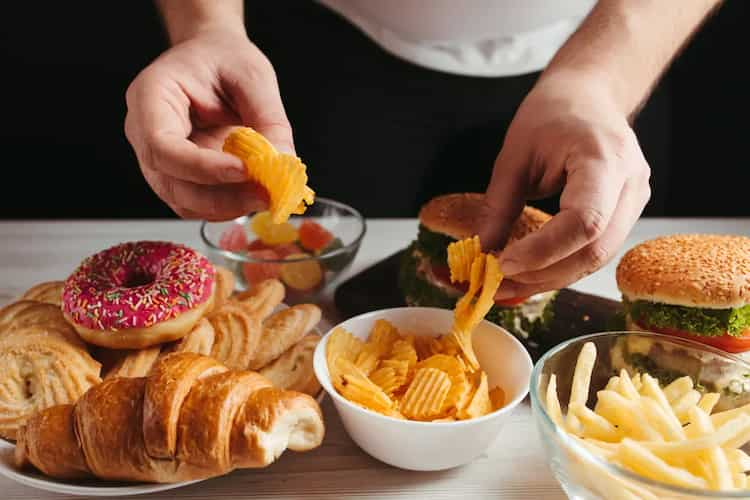Dussehra is a well-known Indian holiday that honours the victory of virtue over evil and the dominance of right over wrong. Varied regions of the nation have different interpretations of what Dussehra means. While people in the western and northern states celebrate Ram's triumph over Ravan, those in the southern, eastern, and north-eastern states commemorate Goddess Durga's victory over Mahishasura. The triumph of virtue over evil has always been the focus of the celebration, though. Due to this, Dussehra is seen as the perfect opportunity for us to let go of negative things, poor habits, and unpleasant memories. Today's fast-paced, instantaneous society causes us to unknowingly form a number of unhealthy eating habits. These behaviours include poor dietary decisions and food blunders we occasionally commit. Here are several habits we should think about quitting as we get ready to celebrate Dussehra this year on the 5th of October.
Avoiding Junk
What would you choose if you had a choice between ordering some burgers, assembling a salad, or even ordering an Indian meal after a long day at work? For most people, ordering junk would be the solution. As we consume more and more junk food and forego the essential meals that our bodies require, our eating habits have been worsening at an alarming rate. Even if we do consume fruits and vegetables, they are frequently sprayed with harmful chemicals and pesticides. The simplest change we can make to improve our diet is to replace processed foods with healthful organic ones. Choosing organic and natural products is always the best option, from carefully selected spices, sauces, and even beverages to organic breakfast options.

Skipping Breakfast
Stop immediately if you skip breakfast simply because you are running late for work or think a big lunch would make up for it. The most crucial meal of the day is breakfast because it provides your body with the fuel it needs to function properly all day. Skipping this meal might impair your ability to think clearly, cause migraines and mood swings, and raise your chance of developing cardiovascular disorders such as hypertension and obesity.
Poor Meal Planning
One of the biggest obstacles to healthy eating is time, but rushed decisions frequently result in fast food drive-throughs and pizza delivery. Before doing your weekly shopping, set aside a little time to plan your meals for the week. This will ultimately save you money, calories, and time.
Too Many Processed Foods
There are nutrient-depleted convenience foods that are oily, salty, and wherever you look. When choosing more highly processed foods, choose them sparingly and choose fresh, whole foods wherever possible. Labels can help you make informed decisions.
Overlooking Healthy Diet
For your body to work properly, you need to eat a balanced diet. A nutritious diet and adequate hydration are crucial tools for maintaining health, especially in light of the pandemic that hit everyone badly. Be careful to consume the proper proportion of vitamins, proteins, minerals, carbohydrates, healthy fats, and fibre, among other vital nutrients. Reduce the amount of junk food you consume, and attempt to increase your intake of fibre and other vital nutrients. Reduce your consumption of junk food, work to increase the number of greens and fruits in your daily meals, and drink at least 3 litres of water each day.

Sugar loaded Foods
In addition to the excessive amounts of drink, candy, and cookies that people already consume, sugar can be found in unexpected areas including whole grain cereals, salad dressings, condiments, and breads. Analyze the total amount of sugar in your diet and look for strategies to reduce those empty calories.
Mindless Eating
The idea behind mindless eating is that our unconscious choices when it comes to food can have a significant impact on our diet and weight. It contrasts with mindful eating, which encourages actions like eating mindfully and deliberately, identifying hunger and non-hunger triggers, and appreciating the flavours and textures of your meal. These primarily psychological behaviours may have a significant impact on how you consume food and may, over time, have an impact on your health.
Not Eating Together
Eating while preoccupied, overscheduled, and working many shifts is similar to eating mindlessly. Make an effort to have meals together as a family as often as you can by turning off the TV (and yes, even the computer and cell phone) at the same time.

Big Portion Size
You may believe that you can estimate portion sizes by eye, but have you ever measured out your morning cereal, spoonfuls of peanut butter, or frying oil? Overeating can result in a calorie excess, even when it involves nutritious meals. To give yourself some perspective, just repeat it a few times.
Not Eating Enough
Without a doubt, less isn't always better. When you don't consume enough calories during the day, your energy levels drop, your hunger levels rise, and you end up overeating later on (when you're exhausted and eager to eat whatever you see). By distributing calories over time, beginning with a nutritious breakfast, you can avoid eating yourself in the afternoon and evening.


